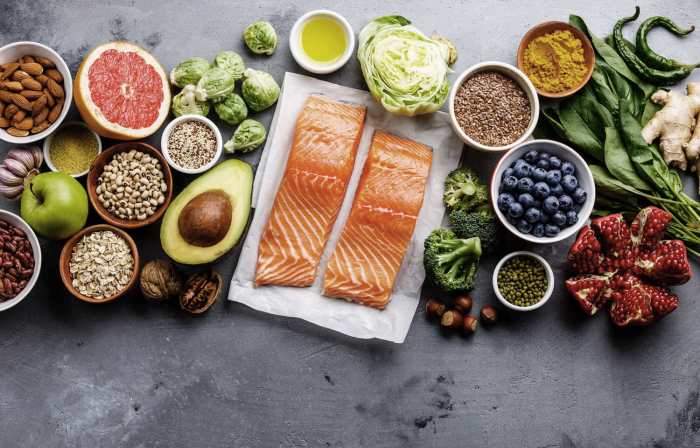Plant based diet with fish – The plant-based diet with fish is gaining popularity as a balanced and ethical way to enjoy the benefits of both plant-based and pescatarian lifestyles. This approach combines the nutritional advantages of a plant-based diet with the essential nutrients found in fish, creating a well-rounded dietary pattern that supports overall health and environmental sustainability.
In this article, we will explore the health benefits, environmental impact, challenges, and practical aspects of adopting a plant-based diet with fish. We will also discuss cultural and ethical considerations, providing a comprehensive overview of this unique dietary approach.
Health Benefits of a Plant-Based Diet with Fish
Adopting a plant-based diet with the inclusion of fish offers a unique combination of nutritional benefits. This dietary approach merges the health-promoting qualities of plant-based foods with the essential nutrients found in fish, providing a well-rounded and nutrient-rich eating pattern.
Incorporating fish into a plant-based diet enhances nutrient intake, particularly in terms of omega-3 fatty acids, vitamin D, and vitamin B12. These nutrients play crucial roles in various bodily functions, including brain health, heart health, and immune system support.
Omega-3 Fatty Acids, Plant based diet with fish
Omega-3 fatty acids, particularly EPA and DHA, are essential fatty acids that the body cannot produce on its own. Fish is a rich source of these fatty acids, and their inclusion in a plant-based diet helps meet the body’s requirements.
Omega-3 fatty acids have been linked to numerous health benefits, including:
- Reduced risk of heart disease
- Improved brain function
- Reduced inflammation
- Boosted immune system
Vitamin D
Vitamin D is a nutrient that plays a vital role in bone health, immune function, and mood regulation. While some plant-based foods contain vitamin D, fish is a particularly rich source.
Including fish in a plant-based diet helps ensure adequate vitamin D intake, which is crucial for:
- Strong bones and teeth
- Reduced risk of osteoporosis
- Improved immune system
- Boosted mood
Vitamin B12
Vitamin B12 is an essential nutrient that is primarily found in animal products. Plant-based foods do not naturally contain vitamin B12, making it crucial to obtain it from other sources.
If you’re looking for a healthy and sustainable way to eat, a pescatarian meal prep might be the perfect option for you. This type of diet focuses on eating seafood, while limiting meat and poultry consumption. By incorporating seafood into your meals, you can reap the benefits of its omega-3 fatty acids, protein, and other essential nutrients.
Including fish in a plant-based diet provides a reliable source of vitamin B12, which is necessary for:
- Red blood cell production
- DNA synthesis
- Nerve function
- Cognitive function
Environmental Impact of a Plant-Based Diet with Fish

Adopting a plant-based diet with fish can have significant environmental benefits. Reducing meat consumption and incorporating more plant-based foods contributes to sustainable food systems and mitigates climate change.
Animal agriculture is a major contributor to greenhouse gas emissions, water pollution, and deforestation. Livestock production requires vast amounts of land, water, and feed, which can lead to habitat loss, soil degradation, and water scarcity. In contrast, plant-based foods require significantly fewer resources to produce.
Water Conservation
- Livestock production consumes large amounts of water, both for drinking and for growing feed crops. Plant-based foods, on the other hand, require much less water to produce.
- For example, producing one pound of beef requires approximately 1,800 gallons of water, while producing one pound of tofu requires only about 300 gallons.
Land Conservation
- Animal agriculture requires vast amounts of land for grazing, feed production, and waste disposal. Plant-based foods, on the other hand, require significantly less land to produce.
- According to the United Nations, animal agriculture is responsible for 70% of global deforestation.
Greenhouse Gas Emissions
- Livestock production is a major contributor to greenhouse gas emissions, particularly methane and nitrous oxide. These gases trap heat in the atmosphere, contributing to climate change.
- Plant-based foods have a much lower carbon footprint than animal products.
- For example, producing one pound of beef emits approximately 27 kilograms of carbon dioxide equivalent, while producing one pound of tofu emits only about 2 kilograms.
By adopting a plant-based diet with fish, individuals can significantly reduce their environmental impact and contribute to a more sustainable food system.
Challenges and Considerations of a Plant-Based Diet with Fish
Adopting a plant-based diet with fish consumption presents certain challenges and considerations that require careful attention. These factors range from potential nutrient deficiencies to protein intake adequacy and the availability of suitable food options.
Nutrient Deficiencies
A primary concern associated with plant-based diets is the potential for nutrient deficiencies, particularly vitamin B12, which is primarily found in animal products. Regular fish consumption can help mitigate this deficiency, as fish are a rich source of vitamin B12.
However, it’s essential to ensure adequate intake of other essential nutrients such as iron, calcium, and omega-3 fatty acids through a balanced and varied plant-based diet.
Protein Intake
Another consideration is ensuring sufficient protein intake. While plant-based foods provide protein, it’s important to consume a variety of sources to meet daily protein requirements. Combining legumes, nuts, seeds, and whole grains can provide a complete amino acid profile. Fish can be a valuable source of high-quality protein, complementing the protein intake from plant-based sources.
Food Availability
The availability of suitable food options can also pose a challenge for those following a plant-based diet with fish. In certain geographical areas or during specific seasons, access to fresh or affordable plant-based foods may be limited. This can make it challenging to maintain a balanced and nutritious diet.
Careful planning, exploring local markets, and considering seasonal produce availability can help overcome these challenges.
Meal Planning and Recipes for a Plant-Based Diet with Fish

Adopting a plant-based diet with fish requires mindful meal planning to ensure adequate nutrient intake while incorporating fish as a protein source. Here’s a practical guide to meal planning and recipe ideas for this dietary approach.
Meal Planning
A balanced plant-based diet with fish should include a variety of fruits, vegetables, whole grains, legumes, and fish. Aim for at least five servings of fruits and vegetables per day, and incorporate whole grains in most meals. Include legumes like beans, lentils, and tofu as protein sources.
Fish should be consumed 2-3 times per week, providing essential omega-3 fatty acids and other nutrients.
Sample Meal Plan
- Breakfast:Oatmeal with berries and nuts, whole-wheat toast with avocado and smoked salmon
- Lunch:Salad with grilled fish, quinoa, roasted vegetables, and mixed greens
- Dinner:Lentil soup with whole-wheat bread, baked salmon with roasted broccoli and sweet potatoes
- Snacks:Fruit, vegetable sticks, hummus, nuts
Recipes
Here are some recipe ideas to incorporate fish into a plant-based diet:
- Grilled Salmon with Lemon and Herbs:Grill salmon fillets and season with lemon juice, olive oil, herbs, and spices.
- Baked Cod with Roasted Vegetables:Bake cod fillets with roasted vegetables like broccoli, carrots, and onions.
- Fish Tacos with Slaw:Fill corn tortillas with grilled fish, cabbage slaw, and a cilantro-lime dressing.
- Lentil Soup with Smoked Trout:Add smoked trout to lentil soup for a protein boost.
- Quinoa Salad with Tuna:Combine quinoa, tuna, chopped vegetables, and a light vinaigrette dressing.
Remember, these are just examples, and there are countless other delicious and nutritious meals you can create with a plant-based diet that includes fish.
Sustainability and Ethical Considerations
Consuming fish as part of a plant-based diet raises important sustainability and ethical questions. It’s crucial to understand the environmental impact of fishing practices and make responsible choices to minimize our contribution to overfishing and habitat destruction.
Overfishing is a significant threat to marine ecosystems, depleting fish populations and disrupting food chains. Unsustainable fishing methods, such as bottom trawling, can damage sensitive habitats and harm non-target species. Additionally, aquaculture, the farming of fish and seafood, can raise concerns about pollution, disease, and the use of antibiotics.
Responsible Fishing Practices
- Choose sustainable seafood options:Look for fish species that are not overfished or caught using destructive methods. Certifications like the Marine Stewardship Council (MSC) and the Aquaculture Stewardship Council (ASC) provide guidance on responsible fishing practices.
- Support local fisheries:Buying fish from local fishermen helps reduce transportation emissions and supports sustainable practices in your community.
- Reduce consumption:Limit the amount of fish you consume to minimize your impact on marine ecosystems.
Ethical Considerations
Ethical concerns related to fish consumption include animal welfare and the rights of non-human animals. Some people argue that fishing involves unnecessary suffering and that we should adopt a vegan diet to avoid contributing to the exploitation of animals.
Others believe that fish are sentient beings capable of experiencing pain and that we have a moral obligation to minimize their suffering. They advocate for responsible fishing practices that prioritize animal welfare.
If you’re looking for a healthy and sustainable way to eat, pescatarian meal prep is a great option. This type of meal plan focuses on eating fish and seafood, while limiting or eliminating meat and poultry. Not only is it good for your health, but it’s also good for the environment.
Cultural and Social Aspects of a Plant-Based Diet with Fish
Cultural traditions, social norms, and accessibility to plant-based foods can significantly impact dietary choices. In many cultures, meat and fish hold central roles in traditional cuisine and social gatherings. Adopting a plant-based diet with fish may require individuals to navigate these cultural and social influences.
Accessibility and Availability
Accessibility to affordable and diverse plant-based foods is crucial for the adoption of a plant-based diet. In some regions, plant-based alternatives may be limited or expensive, making it challenging for individuals to make the switch. Governments and food industries can play a role in improving accessibility by promoting the production and distribution of affordable plant-based foods.
Social Support and Acceptance
Social support from family, friends, and the community can greatly influence dietary choices. Individuals who have a support system that encourages and accepts their dietary choices are more likely to adopt and maintain a plant-based diet. Creating a sense of community and belonging among individuals following a plant-based diet can foster social acceptance and reduce feelings of isolation.
Cultural and Religious Beliefs
Cultural and religious beliefs can shape dietary practices. In some cultures, certain foods hold symbolic or ritualistic significance, making it challenging to deviate from traditional diets. Respecting cultural and religious beliefs is important while promoting plant-based diets. Finding ways to incorporate plant-based foods into traditional dishes or offering alternative options that align with cultural and religious values can help increase acceptance and adoption.
Education and Awareness
Education and awareness about the health benefits and environmental impact of a plant-based diet can empower individuals to make informed choices. Public health campaigns, school programs, and community initiatives can increase awareness about the benefits of plant-based diets and dispel misconceptions.
Providing resources and support to individuals interested in adopting a plant-based diet can help them overcome challenges and make a successful transition.
Final Wrap-Up

In conclusion, the plant-based diet with fish offers a balanced and sustainable approach to nutrition that combines the benefits of both plant-based and pescatarian diets. While it requires careful planning to ensure adequate nutrient intake, the potential health and environmental benefits make it a worthwhile consideration for those looking to improve their overall well-being and reduce their impact on the planet.
FAQ Insights: Plant Based Diet With Fish
Is a plant-based diet with fish considered a vegan diet?
No, a plant-based diet with fish is not considered a vegan diet. Veganism excludes all animal products, including fish, while a plant-based diet with fish allows for the consumption of fish.
What are the key nutrients to watch for when following a plant-based diet with fish?
When following a plant-based diet with fish, it is important to pay attention to nutrients such as vitamin B12, iron, calcium, and omega-3 fatty acids. These nutrients are typically found in animal products, so it is essential to ensure adequate intake from plant-based sources and fish.
How can I ensure I am consuming sustainable seafood?
To ensure sustainable seafood consumption, look for fish that are certified by organizations such as the Marine Stewardship Council (MSC) or the Aquaculture Stewardship Council (ASC). These certifications indicate that the fish have been caught or farmed using sustainable practices that minimize environmental impact.